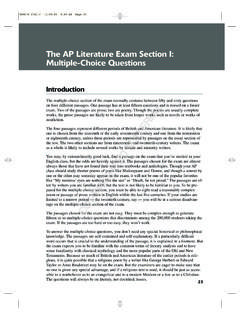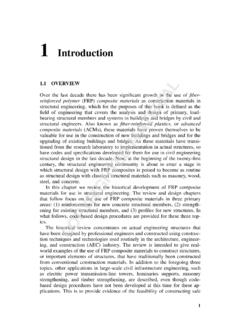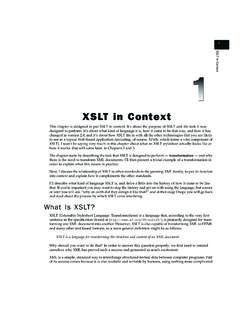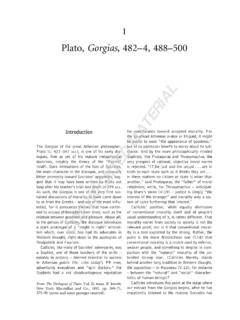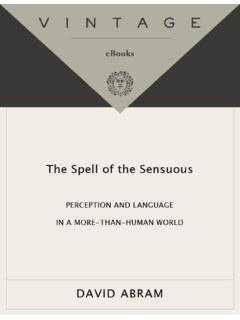Transcription of WHAT IS EXISTENTIAL PSYCHOLOGY?
1 CHAPTER 1 WHAT IS EXISTENTIAL psychology ? EXISTENTIAL PSYCHOLOGYE xistential psychology is the branch of psychology that deals with each humanbeing s relationship to the most essential life dilemmas, the so-called big ques-tions of life. EXISTENTIAL psychology also aims to capture the spirit and feelingof life itself rather than subsuming life under a system of logical and sys-tematic categories. Furthermore, EXISTENTIAL psychology aims to include basicphilosophical reflections in our psychological understanding, at the same timeconstituting the foundation for EXISTENTIAL therapy, counselling and psychology is truly a branch of psychology proper; that is, a field ofresearch with concepts and theories about the world that may be validated orrefuted empirically. It certainly builds on EXISTENTIAL philosophy, which maybe defined as our basic thinking about life and the conditions governing this philosophy as a foundation, EXISTENTIAL psychology is the sum totalof concepts, theories and empirical knowledge that tells us how human beingsinteract with the big issues of life and how the basic conditions governing lifeemerge and are dealt with in everyday life situations.
2 The main applicationof EXISTENTIAL psychology at present lies within therapy. EXISTENTIAL therapyexplicitly invites the client or patient to find their feet when confronted withthe most important life , there are three EXISTENTIAL disciplines building upon each other: philosophy, psychology and therapy. psychology is the body of knowledge that leads youfrom philosophy to therapy. You do not need to be an existentialist , a termused in a wide variety of ways, in order to profit from the fertile insights ofexistential psychology . You just need an open REAL PERSON AND THE ROLE OF PHENOMENOLOGYM ainstream psychology imposes a large number of categories on life. Thesecategories constitute the spectacles through which we observe human MATERIAL2 INVITATION TO EXISTENTIAL PSYCHOLOGYThus within the realms of clinical psychology and psychotherapy, we are notprimarily trained in observing specific human beings in all their individualityand complexity.
3 Rather, we are taught to observe cases of Panic Anxiety , Obsessive-Compulsive Disorder , Dysthymic Disorder and Somatisation asoutlined in the ICD or DSM diagnostic the psychology of personality, we are urged to look for the so-called bigfive ; that is, five broad dimensions of traits according to which the humanpersonality is said to be organised: Extraversion, Agreeableness, Conscien-tiousness, Neuroticism and Openness to experience (John & Srivastura, 1999,pp. 102ff).It is often useful to classify, but how can psychologists, psychiatrists and othertherapists learn to see unique individuals rather than types? This is wherephenomenology comes in. Phenomenology observes or experiences the phe-nomena as they appear in themselves; that is, it ventures beyond the manyideas, stereotypes and images that we carry with us and impose on the phe-nomena we meet.
4 Phenomenology is to meet the phenomenon in itself. Youtry to perceive the other person as they really are, the real person, withouttaking anything for granted. Look at this example:A nurse was looking in on an old man in a nursing home shortly before Christmas. So, Mr Smith, where are you going to celebrate Christmas this year? she askedencouragingly while she washed him. Here . Mr Smith s answer was cross andmorose as usual. Well , she continued supportively, then perhaps someone willcome and visit you here? . No! was the nurse felt both enraged and astounded. She knew for a fact that the old manhad seven brothers and sisters living in neighbouring towns. Many of them couldeasily have put him up on Christmas Eve. She contacted his GP, who got angryand started phoning the man s family.
5 He finally got hold of a sister: Oh, wewould so much like to have him and we invited him a long time ago, but hewould rather celebrate Christmas on his own in the nursing home. What are wegoing to do? What we observe here is a committed and competent nurse who is convincedthat sheknowswhat her patient wants: she does not need to ask him. Accordingto phenomenology, however, we never know what another person wants, noteven our own spouse or child. We have to ask and listen two people talk to each other, each of them usually makes assump-tions about the world-view of the other person: I tend to assume that I lookat the world in the same way as the other person. This tendency is particu-larly strong when the conversation has to do with life s meaning and misunderstandings arise when people in different life situations or fromdifferent cultural backgrounds meet.
6 We also see this pattern in IS EXISTENTIAL psychology ? 3 Phenomenology breaks up this pattern. A phenomenological conversationwill as I show later usually make a person feel deeply understood andwell received. The person will come to life because the authentic, detailed ren-dering of his or her life experience will lead that person to unfold and becomepresent in the room as he or she really was originally an important philosophical school, founded byEdmund Husserl and further developed by maurice merleau -Ponty, MartinHeidegger and a number of other prominent philosophers during the firsthalf of the twentieth century. We can understand the world correctly onlywhen we include the observing subject in our thinking. That is one tenet ofthis philosophical approach. The world is not just there not without can understand ourselves or another human being only if we acknowl-edge that we human beings exist solely in our relatedness to the world.
7 Wedo not exist in isolation (Heidegger, 1926, pp. 58 63; merleau -Ponty, 1945,pp. 491 492).The philosophy of phenomenology later gave rise to methods and approachesfor the empirical disciplines of sociology, psychology and anthropology; aswell as for the applied fields of psychotherapy and psychology , the phenomenological research methods were specificallydeveloped by Amadeo Giorgi and his colleagues at the Duquesne Universityand Saybrook Graduate School in San Francisco. Giorgi founded theJournal ofPhenomenological psychology . In his bookPsychology as a human science(Giorgi,1970), Giorgi argues that psychology should belong to the human sciences, notto the natural sciences. He criticises the psychology of his time for its tendencyto determine its contents by what can be measured rather than by the signif-icance of the topic, meaning that topics like crying, laughing, friendship andlove remain essentially unexamined.
8 He speaks, characteristically, about thehuman sciences rather than the humanities: His goal is to unite the humanitieswith rigorous science. The road to this unity lies in psychotherapy and counselling, the application of phenomenology has beendemonstrated by Ernesto Spinelli in a series of case stories (Spinelli, 1997).Spinelli points out three special rules of the phenomenological method whenused in psychology and therapy:1. Put your expectations and preconceptions as a psychologist or therapist inparenthesis and openly embrace the specific world presented by the rule is calledthe rule of parenthesisor theepoch Describe, do not explain; do away with all explanations and all causalthinking and describe, describe, describe as concretely, down-to-earth andin as much detail as at all possible.
9 This isthe rule of description. For instance,ask the client to describe in detail the situation in which they live or how4 INVITATION TO EXISTENTIAL psychology they feel today or right now, but do not ask them to conjure up causalfactors for their present When your description includes several elements, you should avoid empha-sising any one element for as long as possible. Do not highlight any of theelements as particularly important. Let all elements be equally significantfor as long as possible, lest you prematurely impose a pattern on the mate-rial. What is important will emerge when the time is ripe. This rule is calledthe rule of horizontalisationor the rule of equivalisation (Spinelli, 2005, ).Throughout this book, I will present a number of illustrations that demon-strate how the phenomenological approach can be fruitful in understandingessential psychological phenomena such as happiness, love and is also an important way of accepting and respecting culturaldifferences.
10 Our basic life questions and life dilemmas, as described by existen-tial psychology , have different cultural expressions that all deserve a psychology BE ABOUT LIFE ITSELF?Many psychologists, psychiatrists, therapists and counsellors enter their cho-sen field because they are attracted by the pulsating and varied nature ofhuman life. They are fascinated by sensing the many unique ways in whichhuman beings can unfold their lives. They love to relate to others and to helpthem unravel from their misery and redirect their lives in a more professionals need a body of psychological knowledge and under-standing that respects their interest in specific human lives without reducingthese lives to abstract categories, cause-and-effect relationships and Giorgi proposes the termlife worldas the crux of such a psychol-ogy.
